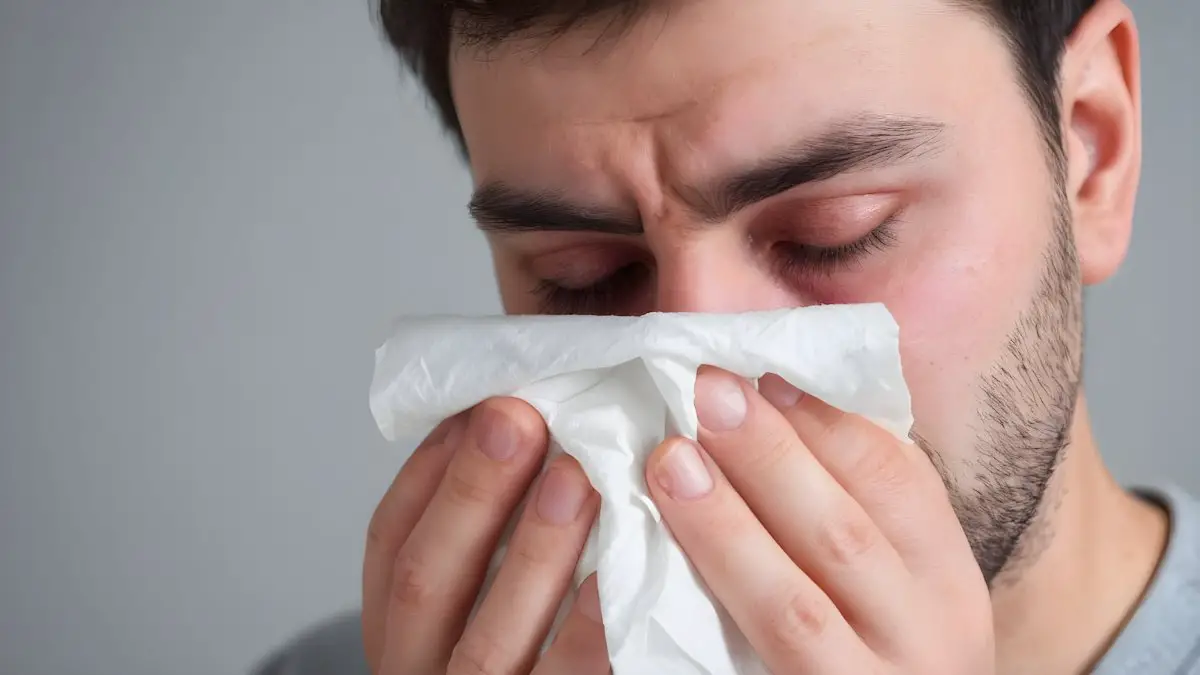What do allergies feel like? Allergies can feel different for everyone, but some clues in your symptoms can give us a better idea. As an allergy sufferer myself, I will share with you what allergies can feel like, as well as cover signs and symptoms that are not usually found with allergies.

Table of Contents
What do allergies feel like?

Experiencing allergies can be a unique and sometimes subtle sensation, but there are common ways people might recognize that they are dealing with seasonal allergies. It’s important to note that individual experiences can vary, but here are some general feelings and signs:
- Change in Voice: Irritation from allergies may affect the vocal cords, leading to a hoarse or scratchy voice.
- Difficulty Breathing: For individuals with respiratory allergies, such as hay fever or pollen allergies, breathing difficulties, or a feeling of tightness in the chest may occur.
- Fatigue: Allergies can contribute to a general feeling of fatigue and lethargy. Constantly dealing with allergic reactions may leave you feeling drained.
- Headache: Some people experience headaches as a result of allergies. This can be due to sinus pressure or congestion.
- Itchy Sensation: Allergies often bring about itching, whether it’s an itchy throat, itchy eyes, or even general skin itchiness.
- Nasal Congestion or Runny Nose: A stuffy or runny nose is a classic symptom of allergies. The body’s response to allergens often includes increased mucus production.
- Skin Reactions: Allergic reactions can manifest on the skin, causing redness, hives, or eczema. This can be particularly noticeable if you contact an allergen directly.
- Sneezing: Frequent and sudden bouts of sneezing, especially in specific environments or seasons, can suggest allergies. This is often a reaction to irritants like pollen, dust, or pet dander.
- Watery Eyes: Allergies commonly cause the eyes to water excessively. You might find yourself rubbing your eyes frequently or needing to use eye drops.
- Worsening of Asthma Symptoms: For those with asthma, allergies can exacerbate respiratory symptoms, leading to increased coughing, wheezing, or shortness of breath.
It’s important to keep in mind that while these feelings may suggest allergies, they can also be indicative of other health conditions.
If you suspect you have allergies, it’s advisable to consult with a healthcare professional for an accurate diagnosis and appropriate management.
What Allergies Feel Like: My Perspective
As a lifetime allergy sufferer, my allergies mostly bother me with the traditional symptoms. Here is what my allergies feel like specifically:
- Eyes: Itchy and watery eyes, sometimes with redness, or one eye-watering.
- Nose: itchy, runny, and/or stuffy.
- Skin: Dry with itchiness, sometimes resulting in hives or eczema.
- Throat: Starts with a tickling feel, sometimes progresses to severe itching.
What are NOT typical symptoms of allergies?

While allergy symptoms can vary widely, certain symptoms are not typically associated with allergies. Some symptoms that are generally not indicative of allergies include:
- Body Aches: Generalized body aches and pains are not common symptoms of allergies. These symptoms are more commonly associated with viral or bacterial infections.
- Fatigue (extreme and persistent): While some fatigue can be associated with allergies, extreme and persistent fatigue is not a typical symptom.
- Fever: Allergies do not typically cause a fever. If you’re experiencing a high body temperature, it may be due to an infection or another medical condition rather than allergies.
- Gastrointestinal Issues (severe and persistent): While mild stomach upset can be associated with allergies, severe and persistent gastrointestinal issues, such as intense abdominal pain or chronic diarrhea, may indicate a different digestive or systemic problem.
- Shortness of Breath (without other respiratory symptoms): While allergies can cause respiratory symptoms like coughing and wheezing, sudden or severe shortness of breath without other respiratory symptoms may indicate a different medical issue, such as asthma or a respiratory infection.
- Sore Throat (without other symptoms): While throat irritation can occur with allergies, a sore throat without other typical allergy symptoms may be more indicative of a viral or bacterial infection.
Allergies can manifest differently for each individual, with common symptoms including itching, sneezing, watery eyes, nasal congestion, fatigue, headaches, difficulty breathing, skin reactions, and voice changes. However, individual experiences may vary.
Next up: Check out “Is it a summer cold, or allergies“.
